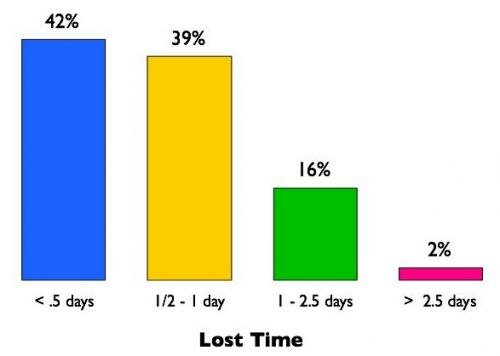About Dan Markovitz
Dan Markovitz is the founder and president of TimeBack Management. Prior to founding his own firm, Mr. Markovitz held management positions at Sierra Designs, Adidas, CNET and Asics Tiger. Learn More...
NEWS, ARTICLES & UPDATES
Timeback Blog 
How much junk do you deal with each day?
Posted March 19, 2007 @ 10:04 AM
The 2005 McKinsey Global Survey of Business Executives revealed that a staggering amount of time is wasted on emails, voice mails, and meetings with no value. None. Zero. Zip. Zilch. Nada. Bubkes. Take a look at their numbers:

Staggering, aren't they? 55% of respondents are losing between 1/2 and 2 1/2 days per week to stuff that's just not helping them professionally or personally. No wonder they're stressed. And you're probably in the same boat.
So what can you do?
You need to filter out this stuff before it ever hits your inbox, your desk, your calendar. You don' t even want to waste time processing this low-value (or no-value) information before tossing it.
Here's how to do it: tell the people you work with what you want to see and what's irrelevant to you. All too often, they're just trying to be helpful: they drop memos on your chair with a "FYI" post-it, invite you to meetings that are tangential or trivial, and include you on Reply All emails -- not because they're trying to bury you, but because they're really trying to help. They assume that you want to know. And I suppose, in a perfect world, you would want to know everything.
But it's not a perfect world. It's a screaming, howling, Force 5 hurricane world of information that just keeps getting worse. Trying to stay on top of all that is the road to madness. Or at least the road to 95 hour work weeks.
Far better to let people know what you don't want. Train them. When you get information that you don't need, send it back to them with an explanation as to why it's irrelevant to you. When you get something valuable, explain that, too. It won't take more than a week before they understand. And if you do this only with the handful of people who generate most of the emails/phone calls/meetings, you'll have taken a big step down the road towards sanity.
They won't get it right all the time, of course. You'll get copied on stuff that you still don't need. And you may -- on occasion -- miss something that you wish you had seen earlier. (Far less often than you might think, though.) But on balance, you'll be better off. And so will your business.
Cogitus Interruptus
Posted March 13, 2007 @ 1:31 PM
We've all experienced the dreaded cogitus interruptus: you're in the middle of a complicated spreadsheet or a delicately worded proposal or just plain thinking (in the words of Jack Handy) deep thoughts. Just when you're about to have your Eureka! moment, someone taps you on the shoulder or sticks his head into your office and says, "Dan, got a sec? Just a quck question. . . " (which, of course, never is). And just like that, you've lost your train of thought, and with it, the cure for cancer, the recipe for transmuting lead into gold, or the angle for getting the company to pay for your boondoggle of a trip to Paris.
In today's open offices -- and with the near-universal belief in an open door policy -- it's getting increasingly difficult to find time to work without interruptions. What can you do?
A company I know has a totally open floor plan. They don't have any offices, and the cube walls are low -- about chest height -- so there's no privacy. They've found a simple solution: each person has made two paper signs. A green sign (made with green highlighter) says "open," which means they're available to talk. A red sign has a time written on it -- in other words, "do not disturb until ___ o'clock."
It's cheap, it works, and it keeps you sane. Think about it. (Without interruption.)
Consulting services brought to you by Rodin.
Posted March 10, 2007 @ 8:18 PM
Our friend over at Evolving Excellence, Kevin Meyer, brings to our attention a serious problem for consultants: big brain syndrome. Check it out here: you'll laugh, you'll cry, you'll forward it. Promise.

